Search Further
Kindly select atleast one option
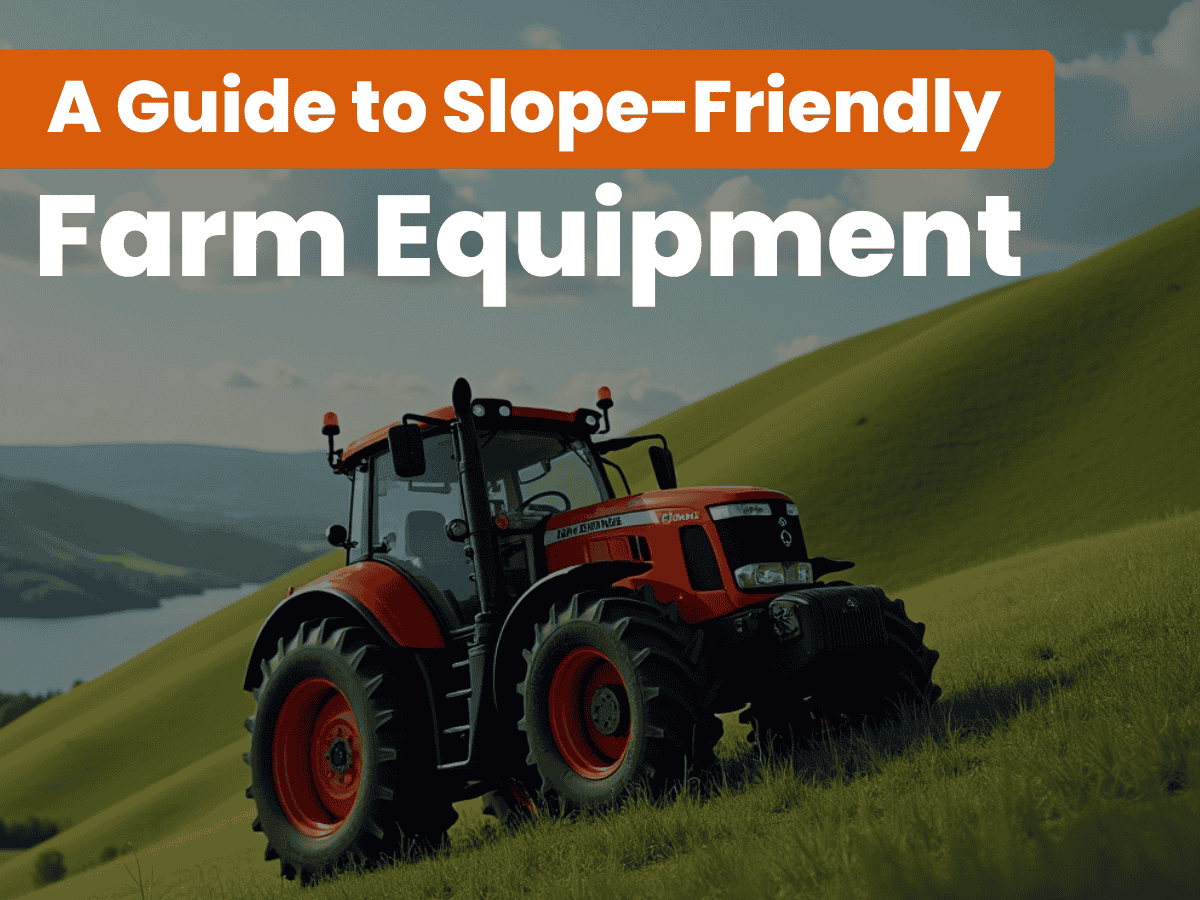
ceat-speciality:blogs-tags/all,ceat-speciality:blogs-tags/equipment
A Guide to Slope-Friendly Farm EquipmentA Guide to Slope-Friendly Farm Equipment
Farming on sloped or hilly terrain presents a unique set of challenges for farmers. From soil erosion to uneven crop growth, working on slopes requires specialised tools and equipment designed to improve safety, efficiency, and overall productivity.
As farming becomes increasingly diverse, the demand for slope-friendly farm equipment has grown, especially for those working in areas with rugged landscapes. At CEAT Specialty, we understand these challenges and offer innovative solutions for managing slopes effectively.
In this guide, we’ll explore the essential farm equipment designed for slopes, the importance of selecting the right tools, and how to ensure maximum efficiency and safety while working on uneven land.
1. Tractors for Sloped Terrain
Tractors are the backbone of modern farming, but working on slopes requires a tractor that’s both stable and powerful. Standard tractors may struggle on inclines, posing a risk to both the machinery and the operator. That’s why it’s essential to choose a tractor specifically designed to handle sloped terrain.
Tractors with Low Centre of Gravity (LCG) are ideal for hilly areas as they provide better stability and balance on uneven ground. These tractors are engineered to lower the centre of gravity, making them less likely to tip over when working on steep slopes.
Additionally, tractors with four-wheel drive (4WD) are often preferred for slopes, as they provide better traction and stability, especially in muddy or loose soil. These tractors are equipped to handle rough terrain and are versatile enough to handle various tasks like ploughing, hauling, and tilling, even on steep land.
When choosing a tractor for slopes, it’s important to look for a model with adjustable wheel settings. Larger, wider wheels can offer more grip and stability, reducing the risk of the tractor sliding or losing traction on slopes.
2. Slope-Friendly Farm Tyres
The tyres on your machinery are crucial when working on sloped land. Proper tyres can make a significant difference in performance, especially when dealing with muddy or uneven terrain. For slopes, it’s essential to choose specialised farm tyres that provide optimal grip and traction.
Radial Ply tyres, like those offered by CEAT Specialty, are designed for maximum stability and weight distribution. These tyres provide superior traction while also reducing soil compaction, an important factor when farming on hilly land. Additionally, radial ply tyres offer longer-lasting durability, which can be beneficial when working in harsh, uneven conditions.
For steeper slopes, flotation tyres or wide, low-pressure tyres can help distribute the weight of the machinery more evenly across the surface, reducing the risk of rutting and minimising damage to soil integrity. These tyres are designed to minimise compaction and help the equipment float on top of the soil, which is especially useful in areas prone to erosion.
3. Sloping Terrain Mowers and Grass Cutters
Maintaining grassy fields or orchards on slopes can be difficult using standard mowers, as they may struggle to maintain stability. For this reason, choosing a mower that’s specifically designed for slopes is critical for ensuring smooth operation.
Slope mowers are equipped with a low centre of gravity and wide tyres for better balance on hills. Many of these machines also feature hydrostatic drive systems, which provide easy movability and more control, allowing operators to work with confidence on inclines.
Additionally, ride-on mowers with adjustable slope capability allow operators to adjust the angle of the machine, making it easier to mow on a variety of gradients. These mowers are equipped with safety features to prevent tipping, ensuring both the operator’s safety and the longevity of the equipment.
4. Hill-Ready Ploughing and Cultivating Equipment
Ploughing and cultivating land on slopes presents unique challenges, especially when dealing with uneven soil. Using the wrong ploughing equipment can result in uneven cultivation, soil erosion, and reduced crop yields. For this reason, specialized equipment is necessary for successful farming on hilly terrain.
Hill-style ploughs, also known as contour ploughs, are designed to plough along the natural contours of the land rather than across them. This helps prevent soil erosion and water runoff, which are common issues on sloped fields. These ploughs are equipped with larger blades to ensure efficient soil turning and are built to navigate uneven ground without causing damage to the soil structure.
Another useful tool for farming on slopes is the terracing plough, which is specifically designed to build terraces on sloped land. This type of ploughing helps create flat areas where crops can grow without the risk of soil erosion.
5. Harvesters and Specialised Equipment
Harvesting on slopes requires specialised equipment to ensure that the harvest is efficient, safe, and of the highest quality. Slope-friendly harvesters are equipped with features that prevent the machine from tipping and ensure optimal performance on hills.
For example, combine harvesters with tilt adjustments allow the operator to adjust the harvester’s angle to match the slope, ensuring uniform harvesting and reducing the risk of spillage. These machines often have additional safety features like automatic slope detection systems that alert the operator when the angle becomes too steep.
Furthermore, self-propelled harvesters are particularly useful for steep slopes, as they provide better flexibility and allow operators to work on terrain that might otherwise be too difficult for traditional equipment.
6. Ensuring Safety and Efficiency
While slope-friendly farm equipment is designed to handle the challenges posed by uneven terrain, safety should always be a top priority. When working on slopes, it’s essential to always ensure that equipment is properly maintained, as worn-out machinery is more prone to failure in challenging conditions.
Additionally, operators should receive proper training on how to safely operate machinery on sloped land, as the risks of accidents are higher. Regular inspections and maintenance, especially on tires and hydraulic systems, can help prevent malfunctions and ensure maximum efficiency during operations.
Conclusion
At CEAT Specialty, we offer a range of high-quality tyres and equipment designed to help farmers thrive on uneven ground. By investing in slope-friendly farm equipment, you can ensure smoother operations and better results, even in the most challenging terrain.
Read the full blog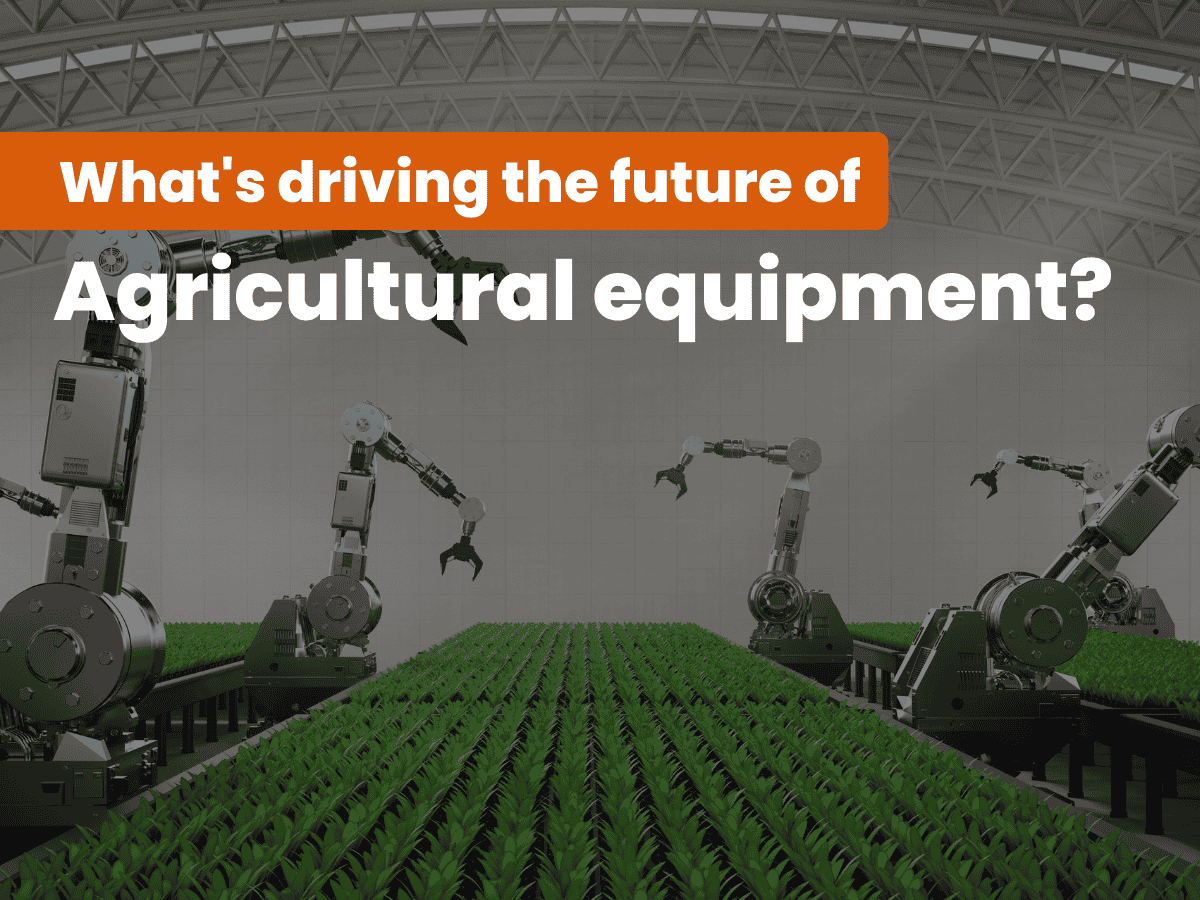
ceat-speciality:blogs-tags/all,ceat-speciality:blogs-tags/equipment
What's Driving the Future of Agricultural Equipment?What's Driving the Future of Agricultural Equipment?
The agricultural sector, which feeds the global population, is undergoing a transformation driven by technological advancements, sustainability goals, and the need for increased efficiency.
As farmers face challenges such as climate change, labour shortages, and the rising cost of resources, the agricultural equipment industry is evolving to meet these demands.
The future of agricultural equipment is being shaped by innovations that enhance productivity, reduce environmental impact, and integrate cutting-edge technologies.
In this blog post, we will explore the key factors that are driving the future of agricultural equipment and how these advancements are set to revolutionise farming practices globally.
1. Automation and Robotics: Precision Farming
One of the most significant trends driving the future of agricultural equipment is automation. Automation in agriculture refers to the use of machinery and systems that can perform tasks without human intervention. Precision farming, which includes the integration of autonomous tractors, drones, and robotic harvesters, is changing the way crops are planted, monitored, and harvested.
Autonomous tractors and harvesters can navigate fields, plant seeds, and harvest crops with minimal human input. This reduces the dependency on manual labour and helps address labour shortages, especially in rural areas. The use of robotics also ensures precision, which improves yield and reduces waste.
Drones are being used for aerial surveillance, crop monitoring, and precision spraying. These devices can assess plant health, detect diseases, and even apply fertilizers and pesticides directly to where they are needed, reducing the use of chemicals and ensuring optimal crop care. As these systems become more affordable and reliable, their adoption across small and large-scale farms is expected to increase.
2. Electric and Hybrid Equipment: Sustainable Solutions
As the global focus on sustainability intensifies, the agricultural industry is moving towards electrification. Electric and hybrid-powered agricultural equipment is emerging as a viable alternative to traditional fuel-powered machinery. Electric tractors, combine harvesters, and other farm equipment are being developed to reduce carbon emissions, lower fuel costs, and reduce the environmental impact of farming.
Electric tractors, for example, offer a quieter, more energy-efficient solution compared to their diesel counterparts. They are also less maintenance-intensive, with fewer moving parts and a simplified powertrain. These tractors can be charged using renewable energy sources, making them a part of the broader effort to reduce the agricultural sector's carbon footprint.
Hybrid machinery, which combines the power of both electric and internal combustion engines, offers the best of both worlds. These machines can reduce fuel consumption while maintaining the power and performance needed for demanding tasks like ploughing and harvesting. The trend towards electric and hybrid machinery is expected to gain momentum as battery technology improves and charging infrastructure becomes more widespread.
3. Smart Sensors and IoT Integration: Data-Driven Farming
The Internet of Things (IoT) is transforming many industries, and agriculture is no exception. Smart sensors embedded in agricultural equipment are enabling farmers to collect real-time data on soil conditions, weather patterns, crop health, and machinery performance. This data is analysed to provide actionable insights that help farmers make informed decisions, optimise operations, and increase productivity.
For example, sensors can monitor soil moisture levels and send alerts when irrigation is needed, preventing both over-watering and under-watering. This not only conserves water but also improves crop yields. Similarly, sensors can track the performance of machinery, alerting farmers to maintenance needs before breakdowns occur, which reduces downtime and maintenance costs.
Tractors and other machinery connected to IoT platforms can provide a wealth of data that can be analysed for better operational management. Farmers can monitor fuel usage, equipment efficiency, and overall performance in real-time, allowing them to make adjustments that reduce operational costs and improve productivity.
4. Artificial Intelligence (AI) and Machine Learning: Smarter Farming Decisions
Artificial intelligence (AI) and machine learning (ML) are increasingly being integrated into agricultural equipment to enhance its functionality and efficiency. These technologies allow machinery to process large amounts of data and make real-time decisions based on that information.
AI-powered systems are being used to optimise planting schedules, monitor crop health, and predict harvest times. Machine learning algorithms can analyse historical data to determine the best time to plant or harvest a crop, taking into account variables like weather patterns, soil conditions, and plant growth stages. This level of precision helps reduce waste and ensures higher yields.
AI is also being used in autonomous machines to improve their decision-making capabilities. For example, self-driving tractors equipped with AI can autonomously navigate fields, adjust their speed and direction based on crop and soil conditions, and even avoid obstacles. These systems continue to learn from their environment, improving their efficiency and effectiveness over time.
5. Sustainability and Environmental Impact: Meeting Regulatory Demands
Sustainability is becoming a central concern in the agricultural industry, not just from an environmental standpoint, but also due to increasing regulations aimed at reducing carbon emissions and conserving resources. Agricultural equipment manufacturers are responding by designing machines that minimize waste, reduce emissions, and use resources more efficiently.
The use of precision agriculture technology, such as GPS-guided equipment, ensures that seeds, water, and fertilizers are applied only where they are needed, which reduces waste and minimizes environmental impact. Similarly, advancements in crop protection systems, such as targeted spraying systems, help reduce the use of pesticides and herbicides, ensuring that they are only applied to areas that require them.
Farmers are also looking for ways to reduce their environmental impact through practices like regenerative agriculture. Equipment designed to support regenerative practices, such as no-till farming and cover cropping, is increasingly popular. These practices improve soil health, reduce carbon emissions, and enhance biodiversity on farms.
CEAT Specialty’s premium tyres are a perfect fit for the latest agricultural machinery, ensuring superior performance, durability, and fuel efficiency. Designed with advanced tread patterns and materials, these tyres provide enhanced traction and load-carrying capacity, making them ideal for heavy-duty agricultural equipment. CEAT Specialty tyres contribute to optimising machinery performance, supporting the adoption of precision farming, and enhancing overall operational efficiency.
6. Precision Planting and Harvesting: Maximising Efficiency
Precision planting and harvesting equipment, which uses GPS technology and advanced sensors, allows for more accurate planting, spacing, and harvesting of crops. This technology enables farmers to optimise their planting patterns, ensuring that crops are spaced appropriately for maximum growth and yield. It also helps in reducing waste during harvest by ensuring that only mature crops are picked, reducing losses.
The ability to plant and harvest with such precision results in better crop yields and a reduction in the environmental footprint of farming operations. These systems also enable farmers to adapt to specific crop needs, improving overall productivity.
Conclusion
The future of agricultural equipment is set to be shaped by innovations that focus on efficiency, sustainability, and precision. As the world’s population continues to grow, the need for smarter, more efficient agricultural equipment will become even more critical. The adoption of these new technologies will help farmers increase productivity and contribute to a more sustainable and resilient global food system.
By embracing these innovations, the agricultural industry will be well-equipped to tackle the challenges of tomorrow. CEAT Specialty tyres play an important role in ensuring these advanced systems function smoothly and efficiently, optimizing both the machinery and the overall farming process.
Read the full blog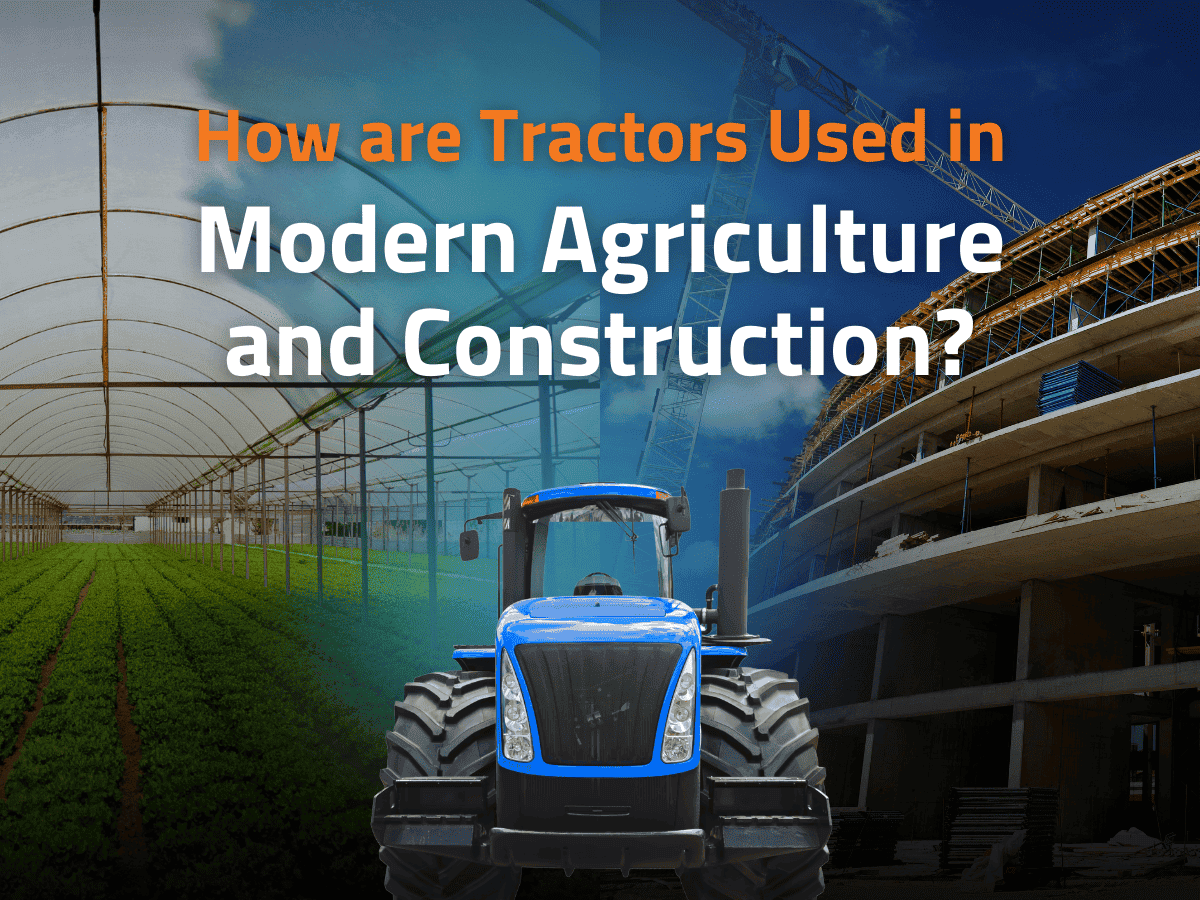
ceat-speciality:blogs-tags/all,ceat-speciality:blogs-tags/equipment
How are Tractors Used in Modern Agriculture and Construction?How are Tractors Used in Modern Agriculture and Construction?
Tractors have become requisite tools in both modern agriculture and construction, offering versatility, efficiency, and advanced technological capabilities that enhance productivity and sustainability.
This blog post will delve into the various uses of tractors in these sectors, highlighting their impact and the benefits they bring to modern operations.
Tractors in Modern Agriculture
- Ploughing and Soil Preparation
Tractors are essential for preparing the soil for planting. Equipped with ploughs, they can break up compacted soil, aerate it, and create a suitable seedbed. Modern tractors often come with advanced hydraulic systems that can handle heavy ploughs and other implements with ease, ensuring efficient and thorough soil preparation.
- Seeding and Planting
Tractors equipped with seeders and planters can sow seeds with high precision, ensuring optimal spacing and depth. This precision leads to better germination rates and higher yields. Modern tractors often integrate GPS and variable rate technology (VRT) to adjust seeding rates based on soil conditions, further optimising resource use.
- Harvesting
During the harvest season, tractors fitted with combines or harvesters can efficiently collect crops. These machines can handle large volumes of crops quickly, reducing the risk of loss due to weather or spoilage. Modern harvesters are equipped with advanced sensors and controls that ensure minimal crop damage and maximum yield.
- Irrigation
Tractors play a crucial role in irrigation by powering pumps and distributing water across fields. Modern tractors can be integrated with precision irrigation systems that use sensors to monitor soil moisture and deliver water only where it’s needed, reducing waste and improving water efficiency.
- Transporting
Tractors are used for transporting goods within the farm or construction site. With trailers or flatbeds attached, they can move heavy loads efficiently. Modern tractors have high towing capacities and can handle various types of trailers, making them versatile for transportation tasks.
- Snow Removal
In regions with heavy snowfall, tractors equipped with snow ploughs or blowers are essential for clearing roads and pathways. These attachments ensure that operations can continue safely and efficiently, even in harsh winter conditions.
Tractors in Construction
- Earthmoving
Tractors equipped with bulldozers or excavators are crucial for earthmoving operations. They can handle large volumes of soil and materials, making them essential for site preparation and grading.
- Hauling
In construction, tractors are often used to haul heavy loads of materials and equipment. Their high towing capacity and robust construction make them ideal for these tasks.
- Grading and Land Levelling
Tractors fitted with grading equipment are used for levelling land and preparing sites for construction. Modern grading systems often use laser technology to achieve high precision, ensuring even surfaces for building foundations.
- Forestry Operations
In forestry, tractors equipped with log skidders or winches are used for logging and clearing land. These machines can handle heavy logs and operate in challenging terrain, making them essential for forest management.
Safety and Environmental Considerations
- Safety Features
Modern tractors come with advanced safety features such as rollover protection structures (ROPS) and reinforced cabs that protect operators from accidents. Regular maintenance and operator training are also crucial for ensuring safe operations.
- Environmental Impact
Tractors with green engines and emission control systems minimise the environmental impact of farming and construction activities. These eco-friendly features help reduce greenhouse gas emissions and other pollutants, contributing to more sustainable practices.
CEAT Specialty's Role in Modern Agriculture and Construction
CEAT Specialty's premium tyres are best fit to the latest tractors equipped for modern agriculture and construction. The FARMAX R85 tractor tyres, for example, offers better roadability and superior traction. This ensures reduced soil compaction and damage. It also provides long tyre life.
The GM XL construction tyres ensure high mileage and are ideal for heavy-duty application. They resist to cuts and snags with optimised wear.
CEAT Specialty tyres are designed with advanced features that enhance their performance and durability. The tyres feature flexible sidewalls that adapt to varying terrains and loads, ensuring that the tyre maintains contact with the ground and reduces the risk of slippage. The unique tread compound provides durability and resistance to wear and tear, ensuring long-lasting performance.
CEAT Specialty is a preferred supplier of tractor tyres to major global tractor manufacturers, including John Deere, AGCO, Massey Ferguson, JCB, Mahindra, CNH, and more.
CEAT Specialty tractor tyres are built to the manufacturer’s specifications and designed to offer high mileage and durability. The tyres come in multiple tread patterns, ensuring they meet the varied needs of farmers and construction professionals.
Conclusion
By leveraging the latest technologies and adhering to safety and environmental guidelines, tractors can significantly improve productivity and contribute to a more sustainable future. CEAT Specialty’s premium tyres are designed to meet the demands of modern tractors, providing the grip, durability, and performance needed for efficient operations in both agriculture and construction.
Read the full blog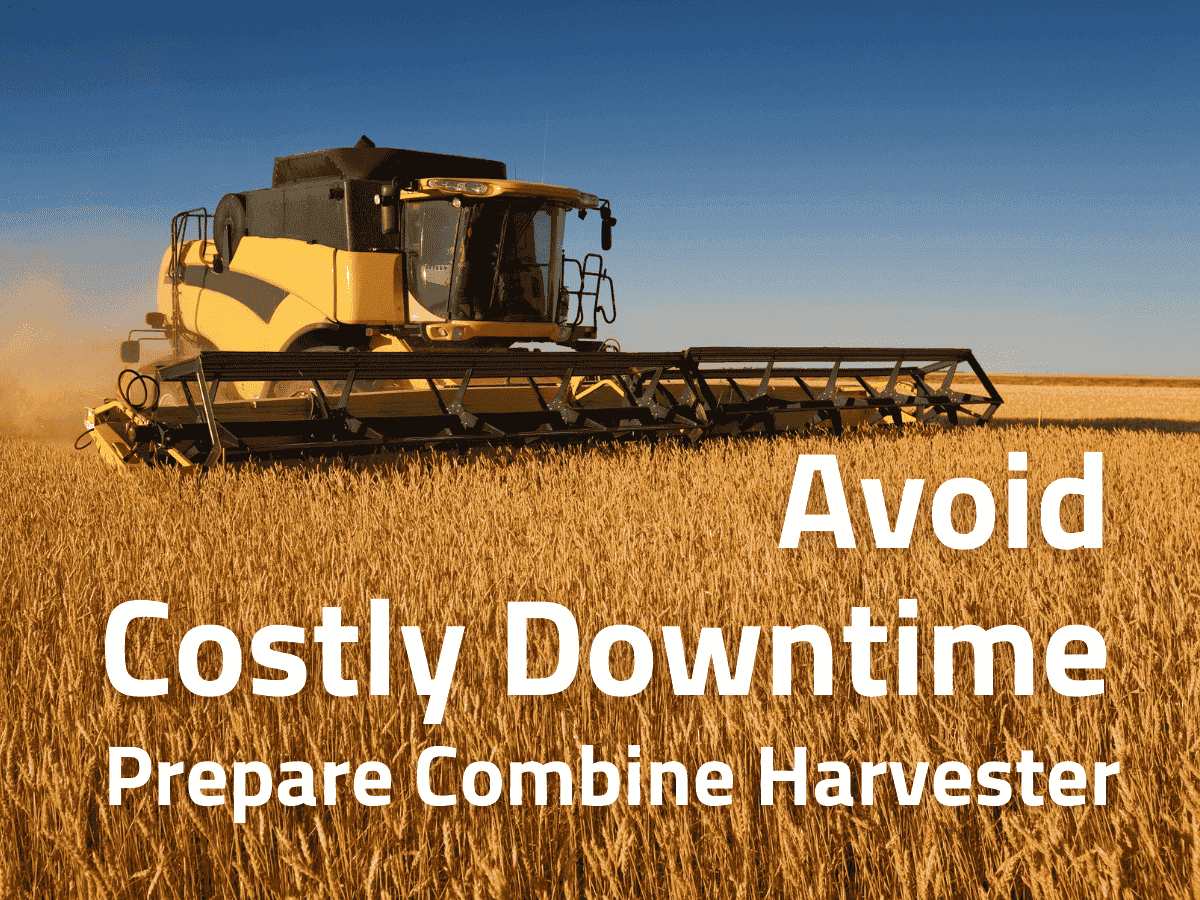
ceat-speciality:blogs-tags/all,ceat-speciality:blogs-tags/equipment
Avoid Costly Downtime: Prepare Your Combine Harvester NowAvoid Costly Downtime: Prepare Your Combine Harvester Now
Harvest season is a critical time for farmers. And the efficiency of your combine harvester can make or break your productivity. Downtime during this period can lead to significant financial losses, as crops left unharvested can deteriorate quickly. To ensure your combine harvester is ready to tackle the demands of the season, follow these essential maintenance tips and best practices.
1. Pre-Season Inspection
Before the harvest season begins, conduct a thorough inspection of your combine harvester. This step is crucial for identifying and addressing potential issues early, preventing costly breakdowns during peak operation.
- Check Fluid Levels: Ensure that all fluids, including engine oil, hydraulic fluid, and coolant, are at the correct levels. Low fluid levels can lead to overheating and mechanical failures.
- Inspect Belts and Chains: Look for signs of wear or damage on belts and chains. Replace any that show cracks or excessive wear to prevent sudden breakages.
- Examine Bearings and Gears: Check for any unusual wear on bearings and gears. Lubricate them as needed to ensure smooth operation.
2. Regular Maintenance During Harvest
Regular maintenance during the harvest season is just as important as pre-season preparation. It helps keep your combine harvester in optimal condition and minimizes the risk of unexpected breakdowns.
- Daily Cleaning: Remove debris and crop residue from the machine daily. Accumulated debris can cause overheating and reduce efficiency.
- Monitor Filters: Check and clean or replace air and fuel filters regularly. Clogged filters can restrict airflow and fuel supply, leading to reduced performance.
- Inspect Cutting Components: Regularly inspect the cutting components for wear and sharpness. Dull blades and worn parts can reduce cutting efficiency and increase fuel consumption.
3. Proper Storage and Winterisation
After the harvest season, proper storage and winterization of your combine harvester can extend its lifespan and ensure it’s ready for the next season.
- Clean Thoroughly: Before storing, clean the machine thoroughly to remove any remaining crop residue, dirt, and debris.
- Lubricate: Apply lubricants to all moving parts to prevent rust and corrosion during storage.
- Cover: Use a breathable cover to protect the machine from moisture and dust. Ensure the cover allows for air circulation to prevent mould and mildew.
4. Training and Safety
Ensuring that operators are well-trained and follow safety protocols can prevent accidents and reduce downtime.
- Operator Training: Ensure all operators are familiar with the machine’s controls and safety features. Proper training can prevent misuse and damage.
- Safety Checks: Conduct regular safety checks, including inspecting emergency stop mechanisms and safety guards. Ensure all safety features are in good working order.
5. Sustainable Practices
Incorporating sustainable practices into your farming operations can benefit the environment and improve the efficiency and longevity of your machinery.
- Soil Health: Implement practices like crop rotation and cover cropping to maintain soil health. Healthy soil reduces the strain on machinery and improves overall crop yield.
- Efficient Irrigation: Use water-efficient irrigation systems to reduce the need for frequent watering, which can strain machinery and increase fuel consumption.
CEAT Specialty: The Right Tyres for Your Combine Harvester
When it comes to the tyres on your combine harvester, choosing the right ones can significantly impact performance and efficiency. CEAT Specialty’s premium tyres are designed to meet the demands of modern farming equipment. The CEAT YIELDMAX tyres, for example, are engineered to support heavy machinery and provide higher load capacity. These tyres feature a lower lug angle around the shoulders for higher traction and sharper shoulders for excellent grip. The higher lug angle around the centre lug is for better side stability.
CEAT Specialty tyres are known for their durability and resistance to punctures, reducing the frequency of tyre maintenance and replacements. The advanced rubber compounds and tread designs ensure superior grip in various conditions, whether in muddy fields or on paved roads. By choosing CEAT Specialty tyres, you can enhance the efficiency and reliability of your combine harvester, ensuring it performs at its best during the critical harvest season.
Conclusion
Preparing your combine harvester for the harvest season is essential for avoiding costly downtime and ensuring a successful harvest. Invest time in maintenance and preparation to ensure your combine harvester is ready to deliver optimal performance when you need it most. Choose CEAT Specialty tyres to further enhance the efficiency and reliability of your combine harvester.
Read the full blog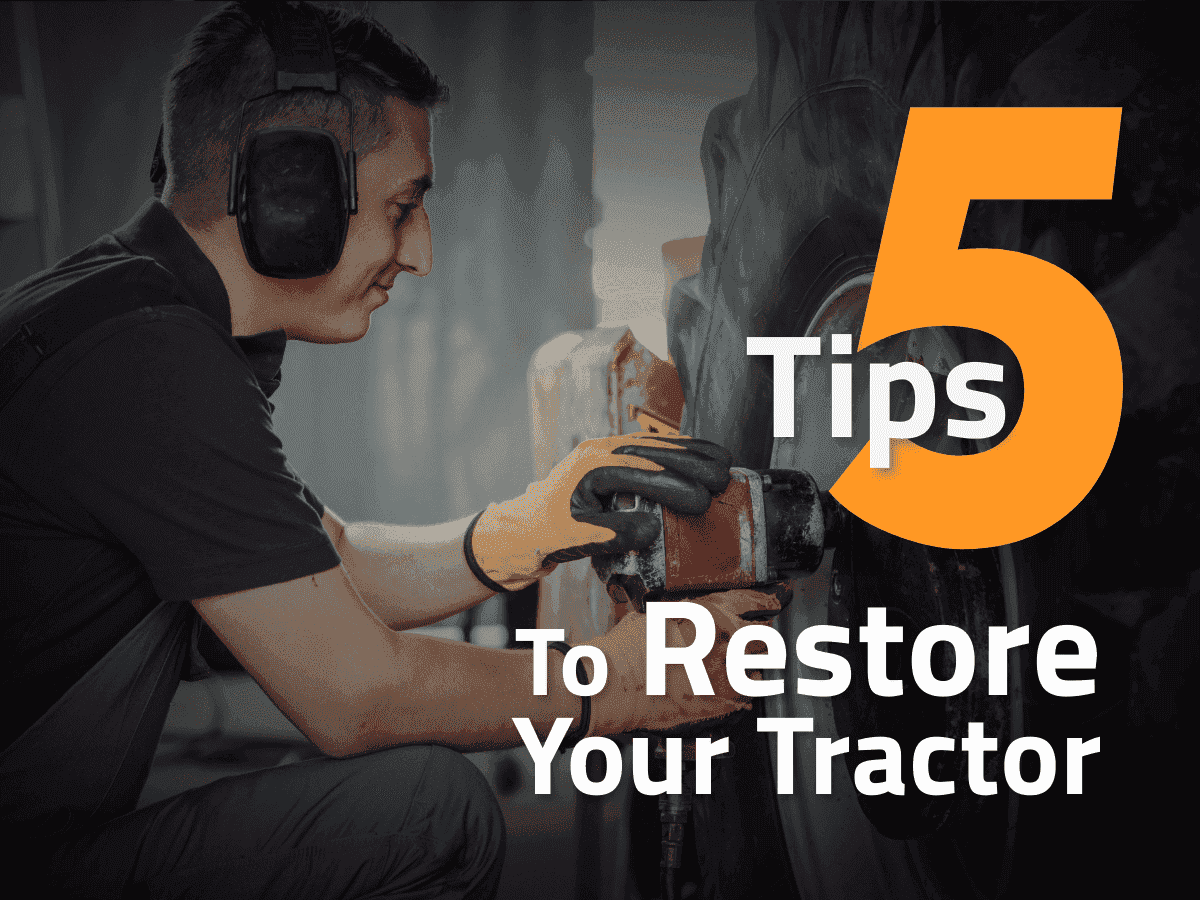
ceat-speciality:blogs-tags/all,ceat-speciality:blogs-tags/equipment
5 Tips for Restoring Your Tractor5 Tips for Restoring Your Tractor
Tractors are more than just machines; they're often a symbol of heritage, hard work, and rural life. Restoring a classic tractor can be a rewarding experience, bringing a piece of history back to life. But it's a project that requires careful planning, dedication, and a bit of know-how.
This blog post outlines five essential tips to guide you through the tractor restoration process, ensuring a successful and satisfying outcome.
1. Start with a Thorough Inspection
The first step in any tractor restoration is a comprehensive inspection. A detailed assessment of your tractor's overall condition is essential to identify both the visible and hidden issues.
- Evaluate the Tractor's Condition
Carefully inspect every component of the tractor. Note any rust, damage, missing parts, or areas of significant wear. Take detailed photographs and make a comprehensive inventory. This assessment will determine the scope of the restoration and help you prioritize tasks.
- Define Your Goals
What do you envision for the restored tractor? Will it be a showpiece, a working machine, or a combination of both? Defining your goals will influence the level of detail and authenticity you aim for. A working tractor might require more emphasis on mechanical reliability, while a show tractor might prioritize cosmetic perfection.
- Set a Budget
Restoring a tractor can be expensive. Establish a realistic budget early on and stick to it as closely as possible. Unexpected costs are common, so it's wise to include a contingency fund. Prioritize essential repairs over cosmetic enhancements if budget is a concern.
- Create a Timeline
Restoration projects often take longer than anticipated. Develop a realistic timeline, breaking down the project into manageable phases. This will help you stay organised and motivated. Consider factors such as parts availability, weather conditions, and your own time constraints.
- Research and Gather Information
Gather as much information as possible about your specific tractor model. Look for workshop manuals, parts catalogues, online forums, and restoration guides. Connecting with other tractor enthusiasts can provide valuable insights and support.
2. Mechanical Repair
A beautifully restored tractor is nothing without a sound mechanical foundation. Addressing the engine, transmission, and other mechanical components is paramount.
- Engine Rebuilding
If the engine is in poor condition, a complete rebuild might be necessary. This involves disassembling the engine, inspecting each component, and replacing worn or damaged parts. Consider consulting with a professional engine mechanic if you lack experience in this area.
- Transmission and Drivetrain
Inspect the transmission, differential, and other drivetrain components for wear or damage. Replace any worn gears, bearings, or seals. Ensure that all moving parts are properly lubricated.
- Electrical System
The electrical system is often neglected in older tractors. Check the wiring, lights, and other electrical components for damage or corrosion. Replace any faulty wiring or components to ensure safe and reliable operation.
- Hydraulic System
If your tractor has a hydraulic system, inspect it for leaks or other issues. Replace any worn hoses or seals. Ensure that the hydraulic system is functioning correctly.
- Tyres
Tyres are a crucial part of a tractor's performance and appearance. Consider replacing old or worn tyres with new ones that are appropriate for the tractor's intended use. CEAT Specialty offers a wide range of tractor tyres designed for various applications. Choosing the right tyre size, tread pattern, and load capacity is essential for optimal performance and safety.
3. Clean and Remove Corrosion
Cleaning and removing rust are crucial steps in the restoration process. The build-up of dirt, oil, and grime on the exterior parts of the tractor can cause premature wear and corrosion, especially if left untreated. Additionally, old tractors often accumulate significant amounts of rust that can affect their functionality and aesthetic appeal.
- Rust Removal
Rust can be a significant issue when restoring an old tractor. There are various methods to remove rust, including using a wire brush, sandpaper, or a chemical rust remover. For larger areas, consider using an abrasive blaster to remove the rust more efficiently. Once you’ve removed the rust, apply a protective coating to prevent it from coming back.
- Clean the Wheels and Tyres
Don’t forget the tyres during the restoration process. Cleaning the wheels and tyres is vital for both their longevity and functionality. Look for cracks or signs of wear in the tyre tread. Depending on the condition, you may need to replace the tyres with new ones, especially if they are damaged.
- Body Repair
Repair any dents, dings, or other damage to the body panels. Use body filler or welding techniques to restore the original shape.
- Priming and Painting
Proper priming is essential for a long-lasting paint job. Apply several coats of primer, sanding between each coat. Choose a high-quality paint that matches the original colour of the tractor. Apply several thin coats of paint for a smooth and even finish.
- Sticky Labels and Badges
Replace any missing or damaged sticky label and badges. These small details can make a big difference in the overall appearance of the restored tractor.
4. Replace Worn-Out Parts
As you inspect your tractor, you may find several worn-out or damaged parts that need replacing. Identifying these issues early can save you time and money in the long run.
Worn-out belts and hoses can cause a variety of issues. Make sure to replace any cracked or frayed belts and check the hoses for leaks. It’s also worth replacing old fuel lines and air filters that can get clogged or deteriorate over time.
5. Reassembly and Testing
After the individual components are restored, it's time to reassemble the tractor.
- Careful Reassembly
Follow the workshop manual carefully during reassembly. Ensure that all parts are properly installed and tightened.
- Testing and Adjustments
Once the tractor is reassembled, test all systems thoroughly. Check the engine, transmission, brakes, and other components to ensure they are functioning correctly. Make any necessary adjustments.
Additionally, choosing the right tyres is crucial for your tractor's performance, handling, and safety. CEAT Specialty offers a wide range of high-quality tyres specifically designed for agricultural machinery. With durable and reliable tyres, you can ensure that your restored tractor operates at its best. Patience and attention to detail are key to a successful restoration, and with CEAT Specialty by your side, you’ll have the right tyres to complement all your hard work. Happy restoring!
Read the full blog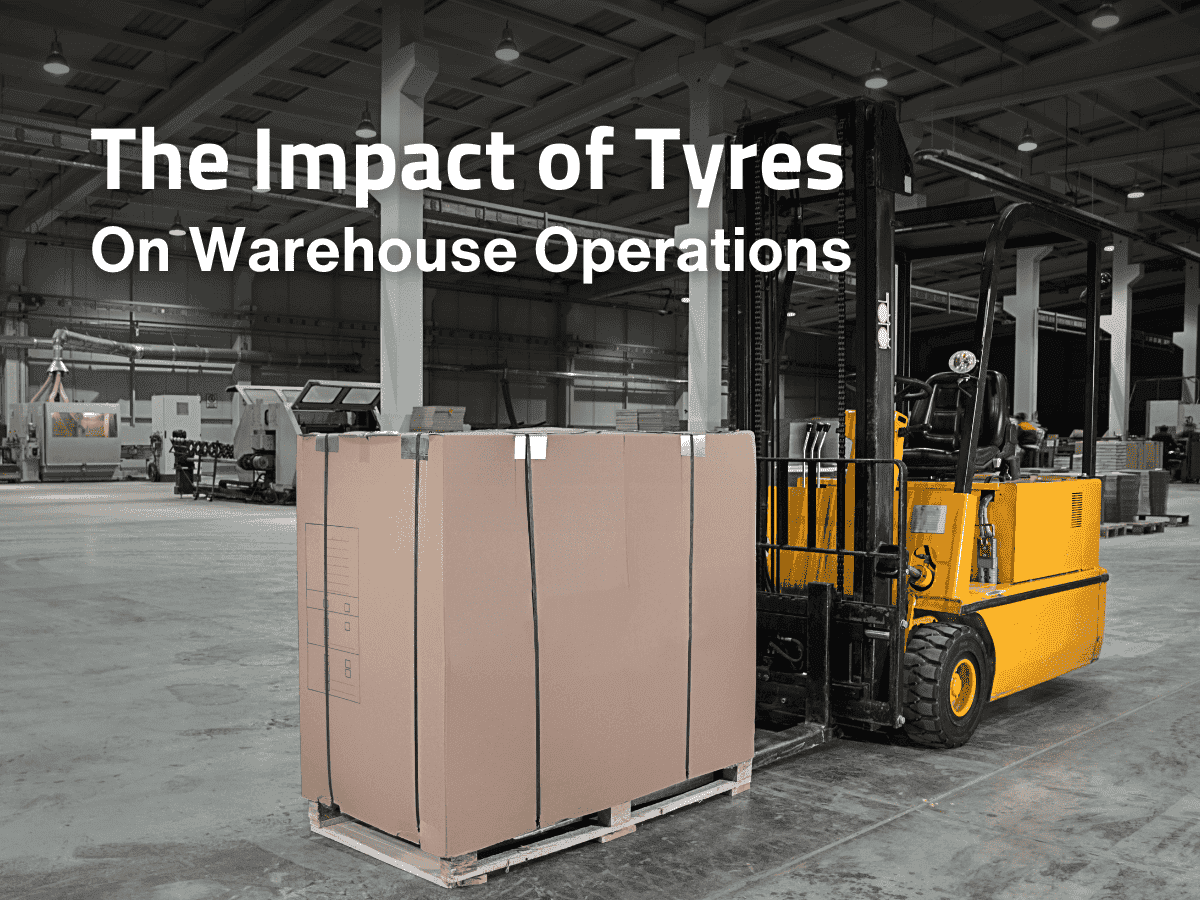
ceat-speciality:blogs-tags/all,ceat-speciality:blogs-tags/equipment
From Forklift to Trailer: The Impact of Tyres on Warehouse OperationsFrom Forklift to Trailer: The Impact of Tyres on Warehouse Operations
Warehouse operations are the backbone of logistics, distribution, and manufacturing sectors. Efficiency, productivity, and safety are at the heart of these operations, with every detail playing a crucial role in maintaining smooth workflow. One often-overlooked element that plays a significant role in these operations is tyres. Whether it’s forklifts or trailers, the tyres used in warehouse vehicles have a far-reaching impact on the performance of equipment and overall efficiency of warehouse functions.
In this post, we will delve deep into the importance of tyres in warehouse operations, exploring how they affect everything from productivity to safety, maintenance costs, and energy consumption.
The Role of Tyres in Warehouse Equipment
Warehouse operations typically rely on a range of vehicles to move goods efficiently. These include forklifts for lifting and transporting heavy loads and trailers for larger-scale transport. While each of these vehicles serves a distinct purpose, all rely on the same fundamental element—tyres—to carry out their tasks.
1. Forklifts: The Backbone of In-House Transport
Forklifts are perhaps the most critical pieces of equipment in any warehouse. They are used to move heavy pallets, stock inventory, and transport items within the warehouse. The performance and efficiency of forklifts are heavily influenced by the tyres they use.
Solid forklift tyres are made from solid rubber and are durable for indoor environments. They are puncture-resistant and require less maintenance, making them ideal for use in warehouses where the surface is smoother, and the risk of tyre damage is lower.
The choice of tyre type directly affects the comfort of the operator, the lifespan of the vehicle, and the efficiency of the operation. Solid tyres tend to be more cost-effective for indoor warehouse settings as they reduce downtime caused by punctures.
2. Trailers: Smooth Transportation Across Larger Distances
Trailers are used in warehouses for bulk transportation, often moving large quantities of goods over longer distances, either within a distribution centre or for shipments to other locations. Trailer tyres need to be robust and durable to support heavy loads, prevent excessive wear, and maintain safety on the road or within a facility.
The importance of tyre quality on trailers cannot be understated. Low-quality tyres can lead to issues like uneven wear, poor fuel efficiency, and even accidents. The right tyres ensure that trailers are safer and more cost-effective. This is especially important in large warehouses that rely on trailers for the movement of goods across various departments.
The Impact of Tyres on Warehouse Operations
1. Efficiency and Productivity
The right tyres can make a significant difference in the efficiency of warehouse operations. Vehicles with proper tyres can move faster, more smoothly, and with less effort, reducing the time it takes to transport goods from one location to another. For instance, high-quality tyres with good traction and wear resistance ensure that forklifts and pallet jacks can operate at optimal speeds without slipping or getting stuck.
Moreover, low-quality or worn-out tyres can create unnecessary delays due to frequent maintenance or accidents, reducing overall productivity. Investing in the right tyres for each vehicle type can enhance operational efficiency and reduce costly downtimes.
2. Safety Concerns
Safety is always a priority in warehouse environments, where forklifts and trailers operate in confined spaces and carry heavy loads. Tyres are essential in ensuring the safe operation of warehouse vehicles. Poor-quality tyres can cause dangerous situations, such as losing traction, slipping, or even tipping over. On the other hand, tyres with proper tread patterns and optimal air pressure provide better grip, stability, and control, reducing the risk of accidents.
Additionally, tyres that are regularly maintained and properly inflated are less likely to fail during operation, further improving safety standards.
3. Cost Efficiency and Maintenance
While it might seem tempting to choose cheaper tyres or delay tyre replacements, doing so can result in higher costs in the long run. Worn-out tyres are less fuel-efficient, wear down quickly, and can result in more frequent maintenance or equipment downtime. On the other hand, investing in high-quality, durable tyres from reputable manufacturers like CEAT Specialty ensures that vehicles operate at their best for longer periods.
Well-maintained tyres also reduce the frequency of breakdowns and repairs, leading to fewer disruptions in daily operations. Ultimately, maintaining tyres in good condition can reduce the total cost of ownership of warehouse vehicles.
4. Energy Consumption
Warehouse vehicles, especially forklifts and trailers, consume energy based on their operational efficiency. Tyres directly impact the energy consumption of these vehicles. Worn-out tyres with reduced traction cause vehicles to work harder, using more fuel or battery power. In contrast, tyres in good condition, with the right tread design, allow for smoother movement and better fuel efficiency.
Conclusion
Tyres may seem like a minor detail in the larger context of warehouse operations, but their impact is undeniable. From forklifts to trailers, the right tyres ensure smooth operations, greater efficiency, enhanced safety, and lower operational costs. Warehouse managers and operations teams should consider tyres as an essential part of their equipment investment strategy, ensuring that their fleet is equipped with the best tyres for the job. Choosing the right tyre manufacturer, like CEAT Specialty, can make a world of difference in maintaining peak performance across the entire warehouse.
Read the full blog
